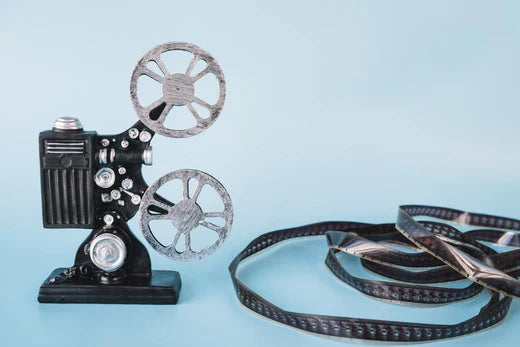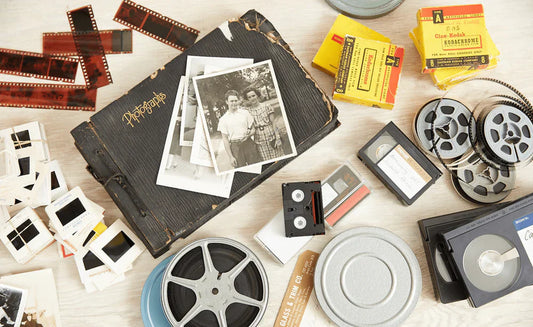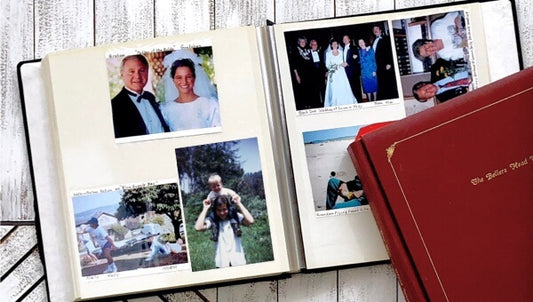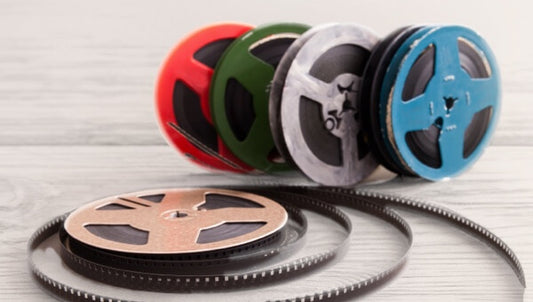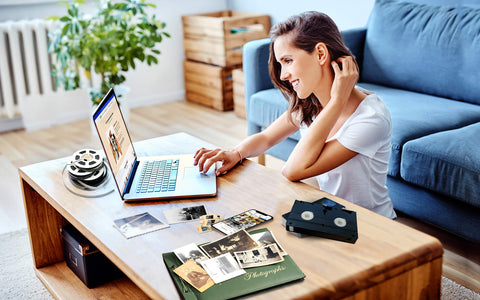Film projectors may no longer be a household staple, but they remain a timeless way to experience the magic of cinema. From classic movie projectors used in 1920s theaters to vintage 8mm and 16mm film projectors cherished for home movies, these devices represent an era when moving images first came to life. Today, collectors, hobbyists, and film lovers still seek old film projectors for their nostalgic charm and craftsmanship. Understanding film projector history not only offers a window into how the technology evolved but also helps you recognize the value and authenticity of your own model. Whether you’re restoring a vintage projector, learning when the first projector was invented, or searching for one to buy in 2025, this guide covers it all.
Jump To:
- The History and Evolution of Movie Projectors
- Analog Turns to Digital and Vintage Film Projectors
- Where To Buy Old Film Projectors in 2025
- Are Old Projectors Worth Anything?
- Maintenance and Repair of Old Film Projectors
- Common Problems with Old Projectors
- The Future of Film Projectors
The History and Evolution of Movie Projectors
The story of film projectors begins long before cinema as we know it. As early as the 1500s, inventors experimented with light and lenses to bring still images to life. Leonardo da Vinci’s 1515 sketch of a light-casting projector box is considered one of the earliest blueprints for visual storytelling.

But when it comes to movie film projectors, the history begins in 1879 when British photographer Eadweard Muybridge created motion using a Zoopraxiscope. This device rapidly projected images from rotating glass discs. Then, in 1888, inventors combined motion photography with projection to display the first moving pictures, followed soon after by Eastman Kodak’s introduction of celluloid film in 1889. This innovation transformed projection into a practical art form and paved the way for early film projectors of the 1890s.
By the 1920s, filmstrip projectors became common in schools, theaters, and the military, marking the rise of the classic movie projector era. These early 1920s film projectors introduced smoother reels and brighter lenses, shaping the foundation of vintage and antique projectors still admired by collectors today.
35mm Film Projectors the Beginning of Cinema
At the dawn of motion pictures in the late 1800s, the 35mm movie projector became the theatrical standard. Built for brightness and durability, these early film projectors powered nickelodeons and grand picture palaces alike. Their sprocketed reels, intermittent movement, and powerful lamps defined how films were shown for decades. While designed for professional booths rather than living rooms, 35mm systems established the mechanics and language of projection that later home formats would simplify.
16mm Film Projectors Expanding Access to Home Cinema
In 1923, Kodak introduced 16mm film as a safer, more affordable alternative to 35mm. hat same year, Victor Animatograph Corporation began producing 16mm cameras along with hand-crank and slide projectors, marking the start of accessible filmmaking. Lighter reels and simpler mechanisms made non-theatrical screenings practical for schools, the military, churches, and community groups. These classic movie projectors bridged the gap between professional exhibition and personal use, setting the stage for true home moviemaking.
8mm Film Projectors a Revolution in Home Movies
Kodak’s 1932 launch of the 8mm format brought filmmaking squarely into the home. Compact cameras and smaller reels meant families could record birthdays, vacations, and everyday life, then replay them on an 8mm movie projector such as the Kodak Instamatic M67.
Mid-century brands including Bell & Howell, Argus, Pathe, Canon, Sankyo, and Keystone expanded the market with both vintage cameras and projectors that made home movies accessible to millions. Known for their portability and reliability, 8mm film projectors defined a generation of family entertainment and remain popular among collectors for their nostalgic appeal and enduring build quality.
Many collectors still ask if 8mm projectors are worth anything, and well-maintained models absolutely hold value for their craftsmanship and nostalgia. If you’ve kept your home movies on reels, it’s easy to convert 8mm film to digital to protect and enjoy those recordings long-term.

Super 8mm Film Projectors the Golden Age of Home Movies
The 1960s ushered in the Super 8mm film projector, improving image clarity, cartridge loading, and reel handling. Standout models from this era included the Chinon GL, Bell & Howell Lumina, and Elmo GS and ST 1200, each offering brighter projection and smoother playback.
Dual-format units like the Bolex 18-3 Dual could run both 8mm and Super 8 film reels, while Kodak’s 1973 Ektasound innovation enabled synchronized sound recording directly on film.
Super 8 became the definitive home format of the 1960s and 1970s, blending the classic movie projector experience with modern convenience, and preserving the unmistakable warmth and motion of true film projection for generations to come. Over time, Super 8 reels naturally deteriorate, so many film enthusiasts choose to convert Super 8 film to digital to keep their original footage safe while making it easy to rewatch or share online.
Analog Turns to Digital and Vintage Film Projectors
With the arrival of digital cinema projectors in the 1980s, it became much easier to use a projector screen to create a high-quality home theater to view home movies and professional cinema projector films. Plus, modern digital options also made it easier than ever before to add animations, headings, full HD video, countdown timers, and more to home movies. Plus, you can now easily transfer and share using apps, email, and social media to play your home movies on any projector, anywhere, anytime.
That’s where digitization for old film movie projector videos became so popular and Capture is happy to preserve your most precious memories in high-quality digital format for future generations to enjoy.
Still, there’s something nostalgic and special about using a vintage movie projector or slide projector so you can watch your old home movies and display them with a projector lens like they were originally intended.
Where To Buy Old Film Projectors in 2025
If you want to buy an old home movie projector in 2025, there are still plenty of places where you can find authentic retro reel-to-reel projectors and vintage film equipment. Whether you’re a collector, restorer, or simply nostalgic about classic cinema, here are some of the best options.

Online Marketplaces
Online marketplaces like Amazon and eBay are probably the easiest way to buy old movie projectors. While Amazon’s selection is limited, eBay has a huge selection of 16mm, 8mm, and Super 8 mm movie projectors for sale. Etsy is also a good place to browse old movie projectors, but it might cost you a little more.
Local Antique Stores and Flea Markets
Don’t forget to check your local antique stores, flea markets, and garage sales for vintage film projectors for sale. This can be a great way to find the most affordable vintage movie projectors as well as parts like a film holder for an old projector model, replacement components, and more. Plus, you may be able to buy from the original owner who can tell you more about it!
Film and Photography Shops
Check out film and photography shops both online and in-person. You might be surprised to find an old film projector as well as the camera to capture even more 8mm or Super 8 mm film! Plus, these places are more likely to take good care of their equipment, so you may find a vintage option that’s in pristine condition.
Are Old Projectors Worth Anything?
The value of an old film projector depends on its condition, format, and rarity. Working 8mm and 16mm models often sell between $50 and $300, while sought-after pieces like early 35mm or Super 8 sound projectors can reach $500 or more. Collectors place higher value on machines with original packaging, lenses, or documentation. Even non-functional projectors can appeal to enthusiasts as decorative collectibles, particularly models with classic mid-century design.
Maintenance and Repair of Old Film Projectors
Proper maintenance is the key to keeping your old film projector in excellent working condition for decades. Even simple care steps can preserve its mechanical parts and protect your irreplaceable film reels. Whether you’re maintaining a classic movie projector, a vintage film projector, or an antique projector passed down through generations, these tips will help keep your device running smoothly.
Keep it Lubricated
Vintage film projectors should have a side door or access panel so you can get into the mechanical portions. Every 6 to 12 months depending on the usage, you should try to lubricate this area with dedicated projector oil. Not all machines need oil, but the older ones that do will have a oil well cup inside. This will not only keep your projector running smoothly, but also make sure it doesn’t damage your precious film reels.
Use High-Quality Replacement Parts
If something breaks, resist the temptation to choose the cheapest fix. Instead, look for a projector parts specialist who restores and tests components before reselling them. Using quality parts protects the rest of your machine and keeps it authentic. Many collectors search for refurbished projector reels, lamps, and belts to maintain their original performance.
Clean Often
Cleaning your old film projector can also keep it in better condition. That’s because dust and debris can scratch the lens and bulb or even scratch your film. Clean often to prevent dust buildup that can clog the machine as well.

Common Problems with Old Projectors
Over time, film projectors can experience belt wear, lamp failure, or film jamming from dried lubricant or worn gears. Many of these issues are simple to fix with cleaning, lubrication, and quality parts. However, more complex electrical or mechanical problems should be handled by a restoration specialist to avoid further damage. Regular inspection helps prevent costly repairs and ensures your projector stays safe to use.
Where to Buy Replacement Parts or Find More Info?
If you need old projector parts or expert advice, several reputable sources specialize in vintage and reel-to-reel projector restoration:
- Wittner-Cinetec.com
- Magna Tech Electronic Co.
- Chicago Film Society
- Urbanski Film Supplies
- Film-Tech 8mm Forum
The Future of Film Projectors
While the rise of digital technology has greatly reduced the popularity of film projectors, there are still collectors and everyday people who buy and sell movie film projectors to enjoy their old home movies. These machines preserve a unique part of film history and let you experience your memories just as they were originally shown - on real reels of film.
Even as digital viewing dominates, there’s something timeless about the soft flicker and mechanical hum of a classic movie projector. Whether displayed as a collectible or used for special screenings, these projectors keep the artistry of early cinema alive.
To make sure your memories last for future generations, we recommend digitizing your old film. Capture’s digitization experts can turn your 16mm, 8mm, and Super 8mm film into high-quality digital copies that can be viewed on a modern digital projector, smartphone, or computer, or even shared across the world on social media. And of course, you’ll still have your original reels to enjoy anytime on your old film projector.




